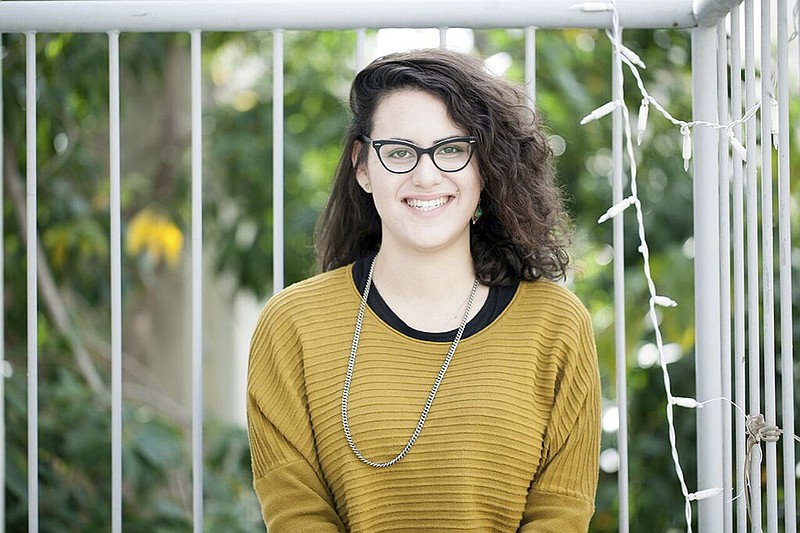JERUSALEM (AP) - A 19-year-old Israeli woman has spent more than three months in military prison in what supporters say is the longest sentence ever handed down to a female conscientious objector.
Tair Kaminer is refusing to perform compulsory military service because of her opposition to Israel's nearly 50-year military occupation of Palestinian lands. Although she is not the first conscientious objector, her lengthy jail term - coupled with a newspaper column she is keeping - are drawing additional attention to her case.
In a phone interview from jail, Kaminer said she is ready to serve the country, just not in a military capacity. She said she is seeking an exemption in order to join Israel's "national service" program, a civilian alternative usually reserved for army-age religious women that allows them to volunteer in schools and hospitals.
Kaminer said she grew up in a home where politics was often discussed, and that she has long opposed Israel's occupation of the West Bank. But her decision not to enlist was cemented while spending a year after high school volunteering with children in Sderot, a hardscrabble town on the border with the Gaza Strip. Sderot has been hit by thousands of rockets fired from Gaza over the years and has been on the front lines of three Israeli wars against Islamic militants.
She said she saw a lot of "hate" among Sderot's children toward Arabs, and she concluded that children in Gaza have a "good reason" to feel the same toward Israelis.
"We are creating generations of hate on both sides that will only make the situation worse," she said. "If we don't stop it, we must oppose it."
In Israel, military service is mandatory for most Jews, with women required to serve for two years and men for three. Exemptions are given for several categories, including people with mental conditions, people who are strictly religious and pacifists, the army said. Those who receive exemptions have the option of joining the national service program.
While the army makes exceptions for pacifists, who oppose violence or war in all forms, it takes a tough stance on conscientious objectors, who refuse to serve on political grounds.
Altogether, Kaminer's supporters say she has spent 111 days behind bars, the longest term ever handed down to a female conscientious objector. There are typically fewer than 10 such cases a year, the army says.
Mesarvot, a group that assists conscientious objectors, says the longest jail term in history was to a man who was imprisoned for 23 months over a decade ago. In most cases, objectors are eventually deemed unfit to serve and dismissed, it said.
In a statement, the military said it was enforcing the law. "Regarding Tair Kaminer, the draftee refused her draft orders and was therefore jailed," it said.
Her current jail term is set to expire on May 28, but she could face additional time if she again refuses to enlist at that time. She already has been sentenced to five terms of 20 to 30 days each.
Emanuel Gross, a former military judge who now teaches law at the University of Haifa, called the case "unfortunate," but said that simply catering to Kaminer's wishes would set a dangerous precedent.
"She's bringing politics into the army. The army is not willing to allow anyone, any person, to bring into the army his political ideas and to take it as a reason not to obey the legal orders," he said.
"If the army would allow any young person to choose the way he prefers to serve, it would make a mess of the notion of equality in our law," he added.
Kaminer said she shares a cell with seven other young women at a military prison in northern Israel. She said they wake up at 5 a.m. for a roll call, and she spends most of the day in the cell reading or chatting with her fellow prisoners. She is allowed several minutes of phone calls each day, and her family is allowed to visit once every two weeks.
In her quest to draw attention to her cause, Kaminer has also written a series of columns about her experience for the Haaretz daily.
In one column, she challenged the notion that the army is above politics. "The army is a political tool that enables the government to continue the occupation of another nation, and for years its main task has been control, not defense," she wrote.
In another, she noted that she and her fellow prisoners wear used American military uniforms. She addressed the column to "Mr. Smith," the soldier who once wore her clothes.
"Your shirt didn't reach me by chance, your country does a bit more than just giving us your old uniforms. So now that you know, does it bother you that your clothes and your money are in effect perpetuating the occupation of the Palestinians, the absence of security in Israel? Do you sleep well at night knowing that?"
Kaminer said she hopes she will soon be released, but that she has no regrets about what she is doing.
"I wasn't really affected by this stuff when I was growing up, but seeing people who are affected by it caused me to understand that the policies of this government favor the status quo instead of change. And that's something that really angered me," she said.
